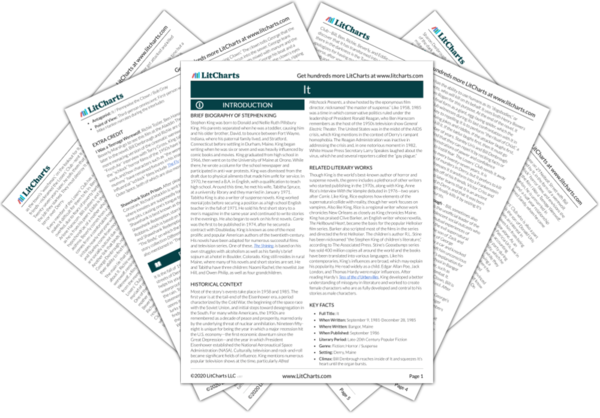“Silver” is the name that Bill Denbrough gives to his oversized, clunky, old gray bicycle. The sight of Bill on the bike is somewhat comic, for it is much too big for him, and the bike’s name makes it sound shinier and newer than it is. Bill takes its name from the horse on the TV show The Lone Ranger. Silver is a symbol of Bill’s heroism and his courage to fight the evil that terrorizes Derry. The bike, which does not really “fit” Bill until he rides it as an adult, is a symbol of the man that he will become—the hero who kills It, another thing that seems too big for Bill to control. While riding Silver, Bill feels heroic and powerful. He outpaces the monsters that chase him, such as the werewolf that Richie Tozier envisions when they flee from the house on 29 Neibolt Street. At the end of novel, Bill and his wife, Audra Phillips, ride away on Silver. He drives away from memory, “but not from desire,” and helps Audra to awaken from her catatonic state. In this instance, Silver helps Bill to take on the more traditional role of the romantic hero, akin to a fairy-tale prince who awakens a sleeping beauty by coming to her rescue.
The color silver also appears elsewhere in the novel. Don Hagarty describes the eyes of Pennywise the Dancing Clown as silver and, when It takes the form of a giant bird that attacks Mike Hanlon in the smokestack at Kitchener Ironworks, Mike notices that It's tongue is silver. King uses silver to connect Bill and It as forces of good and evil, respectively, which are destined to confront each other.
Silver Quotes in It
What a bunch of losers they had been—Stan Uris with his big Jew-boy nose, Bill Denbrough who could say nothing but "Hi-yo, Silver!" without stuttering so badly that it drove you almost dogshit, Beverly Marsh with her bruises and her cigarettes rolled into the sleeve of her blouse, Ben Hanscom who had been so big he looked like a human version of Moby Dick, and Richie Tozier with his thick glasses and his A averages and his wise mouth and his face which just begged to be pounded into new and exciting shapes. Was there a word for what they had been? Oh yes. There always was. Le mot juste. In this case le mot juste was wimps…
There was no zipper on the thing's jacket; instead there were big fluffy orange buttons, like pompoms. The other thing was worse. It was the other thing that made him feel as if he might faint, or just give up and let it kill him. A name was stitched on the jacket in gold thread, the kind of thing you could get done down at Machen's for a buck if you wanted it. Stitched on the bloody left breast of the Werewolf's jacket, stained but readable, were the words RICHIE TOZIER.
He touches his wife's smooth back as she sleeps her warm sleep and dreams her own dreams; he thinks that it is good to be a child, but it is also good to be grownup and able to consider the mystery of childhood…its beliefs and desires, I will write about all of this one day, he thinks, and knows it's just a dawn thought, an after-dreaming thought. But it's nice to think so for awhile in the morning's clean silence, to think that childhood has its own sweet secrets and confirms mortality, and that mortality defines all courage and love. To think that what has looked forward must also look back, and that each life makes its own imitation of immortality: a wheel.












